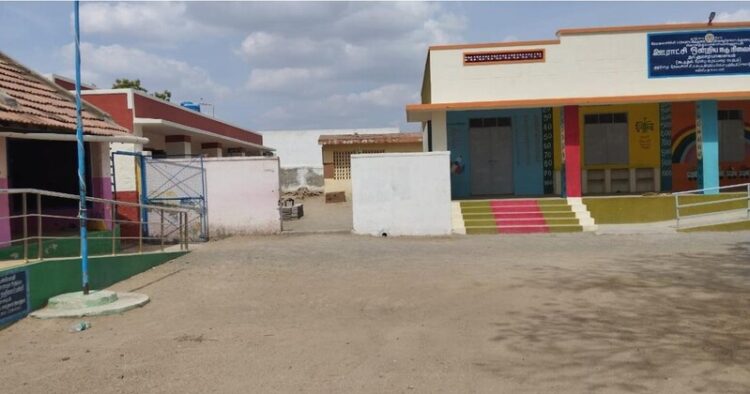In Tamil Nadu, the headmistress of a government middle school, Ilamathi Eshwari, in D Kumarapalayam, Dharapuram taluk, Tirupur district, has been suspended after it was found that she had ordered two Dalit students belonging to the Arunthathiyar scheduled caste community to clean the school toilets. The principal herself is a member of the Pariyar sub-sect of the SC community.
The issue came to light when a video surfaced on social media, showing the two schoolgirls discussing their assigned task of cleaning the toilets daily. In the video, the girls expressed their distress, mentioning that they had not reported the matter to their parents and felt marginalised in their class due to their caste identity. The video quickly garnered attention, prompting calls for action from Chief Minister MK Stalin, Ministers Udhayanidhi Stalin, Anbil Magesh Poyyamozhi, and the school education department.
An inquiry was subsequently conducted, during which the school management committee (SMC) denied the allegations against the headmistress, asserting that external elements had manipulated the girls into making false accusations. The SMC members claimed that the girls had been misled into levelling charges against the headmistress. Despite these claims, the video evidence and the girls’ testimonies prompted authorities to take action, leading to the suspension of the headmistress pending further investigation.
The face and words of the two students aged 11 and 12, tell they are saying the truth. No student would go against their HM and complain in front of a camera. The two girls are students of Class 6.
Parents from the area say, “ We send our wards for education only and not to do other works. Can’t the government not offer to engage scavengers or safai staff to clean toilets. Why do they ask the young ones to do the same?. It is a clear case of caste atrocity.”
https://fb.watch/rIJjZkgT3h/
A relative of the girls told media “Both the parents of the girls are daily wagers. The locality where they reside is dominated by members of the dominant community. When they come to know the incident, they were shocked and they also resisted the HM’s act, but she responded harshly and they were forced to remain silent.”.
Another one said, “ These two Class 6 girls are from poor family. It is believed that HM Elamathi Eswari didn’t like both the girls. She reportedly forced the girls to clean the three toilets at the school. When the girls resisted she threatened them with dire consequences and cut their marks. Unable to bear with the threat, the girls reportedly had been cleaning the toilets for the past several months. We brought it to her attention but she took it casually.”
Tiruppur District Administration said, “Based on the complaint and video, a team of top officials led by revenue divisional officer (Dharapuram) Senthil Arasan, tahsildar and other officials from Education Department inspected the school premises and also conducted inquiry with the HM for several hours. Based on the outcome, appropriate action will be taken.”
In Tamil Nadu’s government schools, a concerning pattern has emerged where young girls are often tasked with menial cleaning duties such as sweeping classrooms, verandas, and common areas, while boys are assigned responsibilities like cleaning playgrounds and toilets. Additionally, both girls and boys are frequently required to fetch drinking water from nearby areas to fill water pots in school premises, staff rooms, and the headmistress’s office. Despite these practices being widely reported in social media, visual, and print media, the government’s response has been inadequate, failing to address the issue effectively.
Critics argue that such practices perpetuate gender stereotypes and reinforce caste-based discrimination, with Dalit and marginalized students often bearing the brunt of these responsibilities. Despite the government’s claims of following a social justice model of governance, there has been a lack of meaningful action to end these practices permanently. Instead, the government’s piecemeal approach of suspensions and subsequent revocations has only emboldened staff members to continue these discriminatory practices with impunity.




















Comments